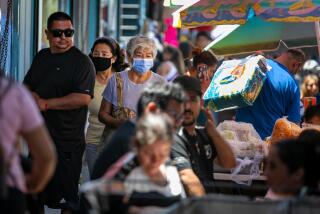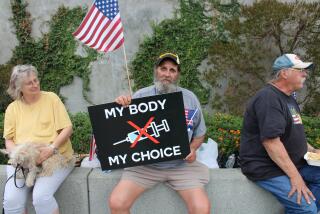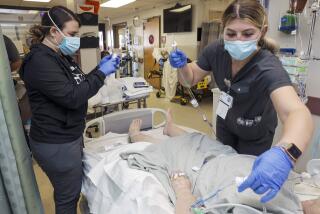To protest COVID mandates, this California town declared itself a ‘constitutional republic’
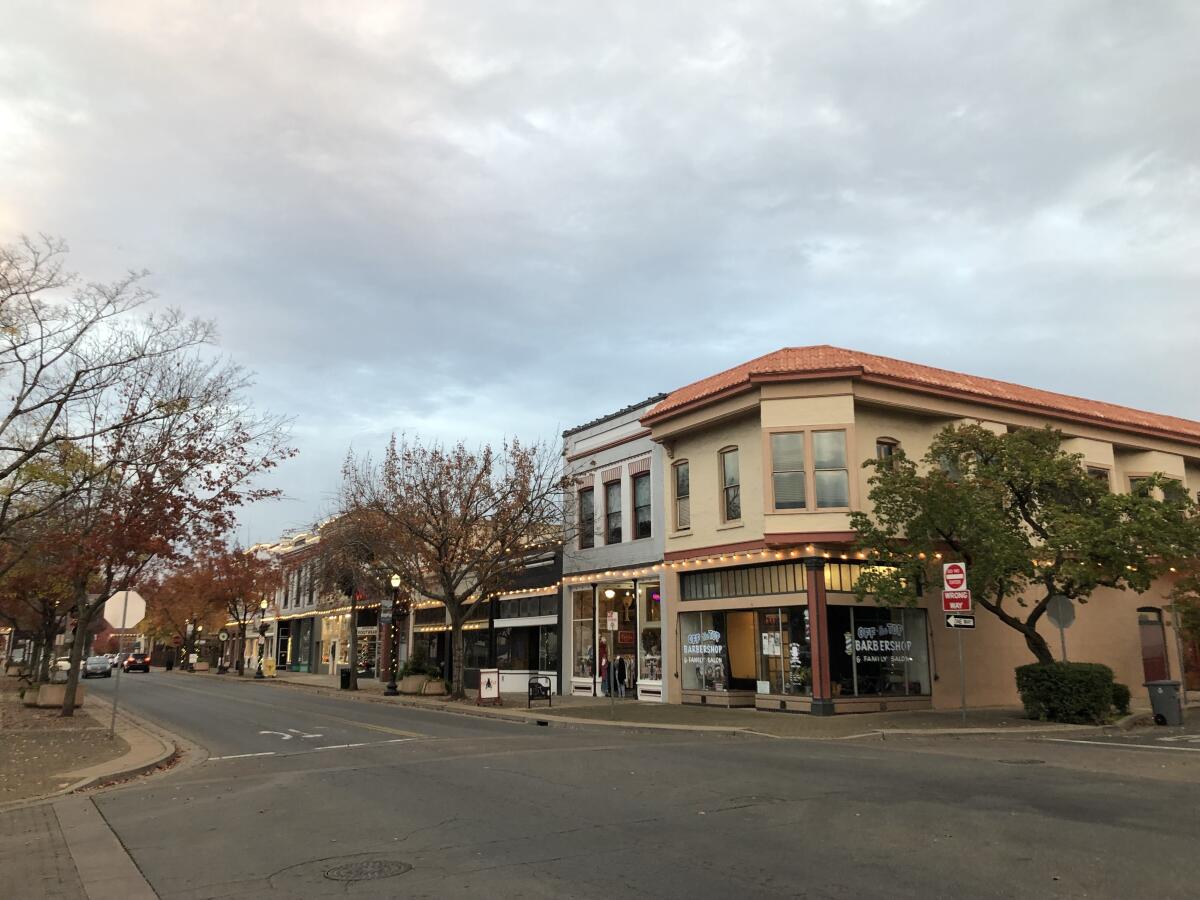
- Share via
OROVILLE, Calif. — For Oroville Vice Mayor Scott Thomson, the father of two young boys, Gov. Gavin Newsom’s mandate requiring schoolchildren to be vaccinated against COVID-19 was the final straw.
He believed the government had no right to tell him what to put into his, or his children’s, bodies. Many of his constituents agreed when it came to pandemic mandates.
And so, he came up with a grandiose, headline-grabbing nom de guerre for his small Northern California city.
Oroville declared itself a constitutional republic. A place where the local leaders pledge to fight mandates they say go too far.
“Any executive orders issued by the State of California or by the United States federal government that are overreaching or clearly violate our constitutionally protected rights will not be enforced by the City of Oroville against its citizens,” read the declaration passed this month by the City Council.
“The desire here is dialogue,” Thomson said.
For some, the declaration was a stand for freedom. But others in town saw it as a reckless tantrum amid an ongoing pandemic that has killed more than 73,000 Californians.
Butte County, population about 220,000, has one of the state’s lowest vaccination rates. As of Saturday, 47% of its residents were fully vaccinated, compared with 64% of all Californians.
Butte County’s largest hospital, the 298-bed Enloe Medical Center in Chico, has averaged 26 COVID-19 patients over the last week — more than all but one hospital in Los Angeles County, home to 10 million people.
Oroville resident Celia Hirschman lost her father, former San Francisco poet laureate Jack Hirschman, to COVID-19 three months ago. She said the resolution insults people who have lost loved ones or are immunocompromised, just to score political points.
“It says we’re cowboys, and we’re not going to live by your rules,” she said. “I don’t think it’s about open dialogue at all. I feel it’s a dangerous measure that they have no business adding to our charter.”
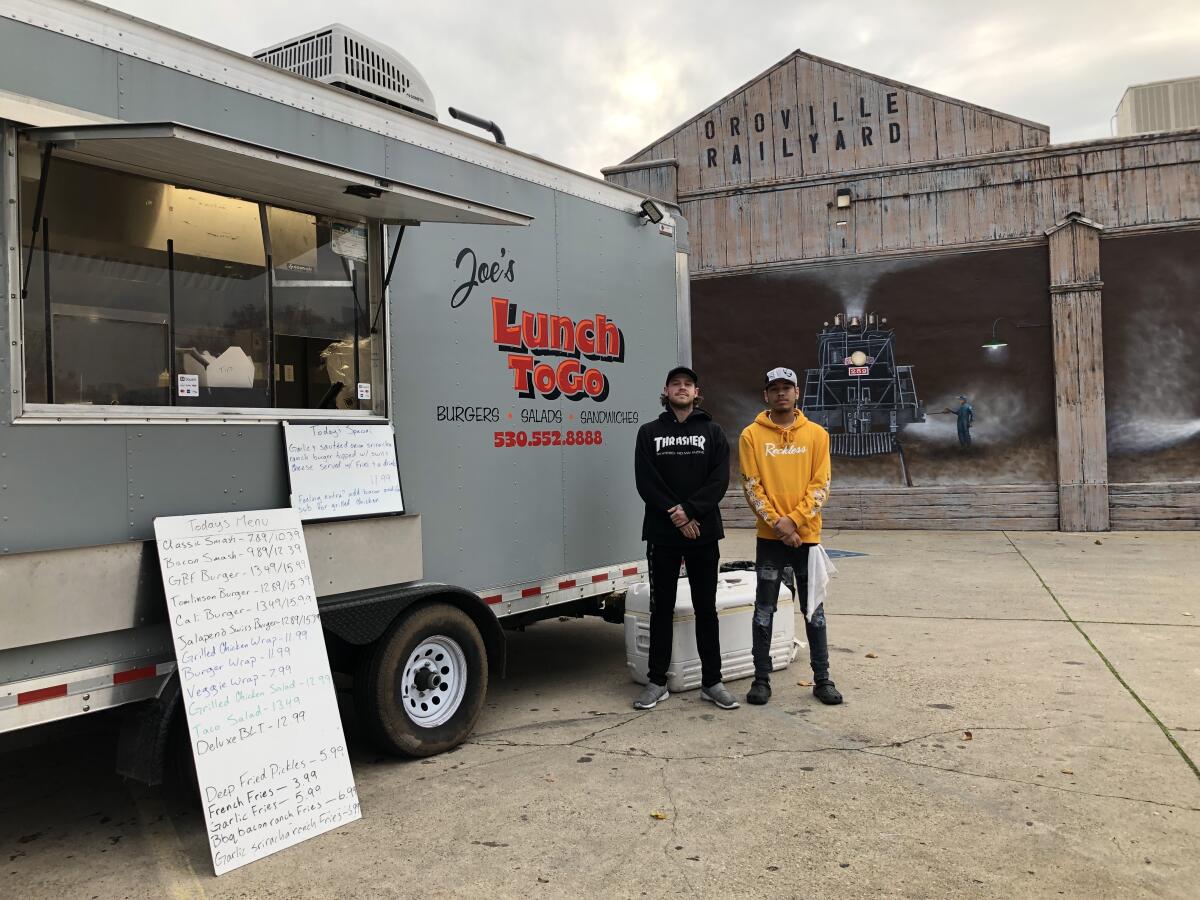
Oroville, a city of 20,000, is now one of a growing number of rural California communities in recent years to label itself a sanctuary or a place otherwise exempt from some liberal ideal.
Two years ago, the desert town of Needles became a “sanctuary city” for the 2nd Amendment in a rebuke of California’s strict gun-control laws. And in defiance of pandemic shutdown orders, the Central Valley towns of Atwater and Coalinga last year declared themselves, respectively, a “sanctuary city for business” and a town where all businesses are essential — with both losing emergency COVID-19 funding in the process.
Designed to benefit from the buzz of California’s “sanctuary” designations used in the context of protecting undocumented immigrants, the labels reflect tensions between rural towns and the Newsom administration — and the left in general.
Oroville’s constitutional republic resolution is mostly symbolic, with no power over schools, which are regulated by the state.
The town is the county seat of Butte County — a purple county where 36% of voters are registered Republicans, 35% are registered Democrats, and 20% are independents. By close margins, the county voted for President Trump in 2016 and President Biden last year. Voters here supported the attempted recall of Newsom.
COVID rates have remained relatively high here, even as they eased significantly in places like Los Angeles and San Francisco. The number of COVID-positive patients during the Delta variant surge, most of whom were unvaccinated, peaked at Enloe Medical Center on Sept. 23, when there were 95 people hospitalized with the virus. Now, the new Omicron variant looms as a potential threat.
“This is a difficult place to be, going into the winter,” said Marcia Nelson, the hospital’s chief medical officer. “We’re not starting from a baseline of under 10 patients; we’re starting from a baseline of what used to feel like a really high number.”
At the Oroville City Council meeting at which the constitutional republic resolution was approved, a city staffer had to clarify to one commenter that the resolution was not “beginning the effort for Oroville to secede from California and from the Union.”
One speaker was an older man who compared the resolution to the decades-old State of Jefferson movement, which calls for California’s rural, conservative northern counties to secede and form their own state.
“These ‘constitutional republic’ people would probably prevent mask mandates,” the man said, citing the county’s vaccination rate. “In other words, they’re looking to kill people.”
The audience broke out in laughter. When the resolution passed, they cheered.
Thomson said the impetus for the declaration was vaccine mandates, especially the one for schoolchildren, which has been opposed by multiple Butte County school districts and has sparked protests across the state, including in cities like Los Angeles.
“Now that the mandates have gone from not just putting something on the outside of your body or modifying how you run your business, but now shoving something inside your body that nobody knows the long-term effects of, that’s just like, OK, now you’re, in my opinion, crossing the line,” Thomson said.
Thomson, the pastor of an Assembly of God church, said he is not anti-mask or opposed to the vaccine for people who want it. He said he and his sons are not vaccinated but that they now have antibodies after a mild bout with COVID-19 in August.
“There are people out there who are like, ‘This whole thing is a hoax,’” Thomson said. “We are not like that, just being reckless.”
He said that unvaccinated city employees are tested weekly for COVID-19 at the city’s expense. And his church has handed out hundreds of masks to congregants.
Council members said they have been inundated with calls and emails about the resolution — positive and negative — from across the country.
“There’s been a lot of expletives,” said Eric Smith, a councilman and president of the Oroville Chamber of Commerce.
Smith said most local business owners support the declaration. He said the broad pandemic closures were a hard pill to swallow because they came amid what has been a local “fiscal renaissance” and growing population in recent years.
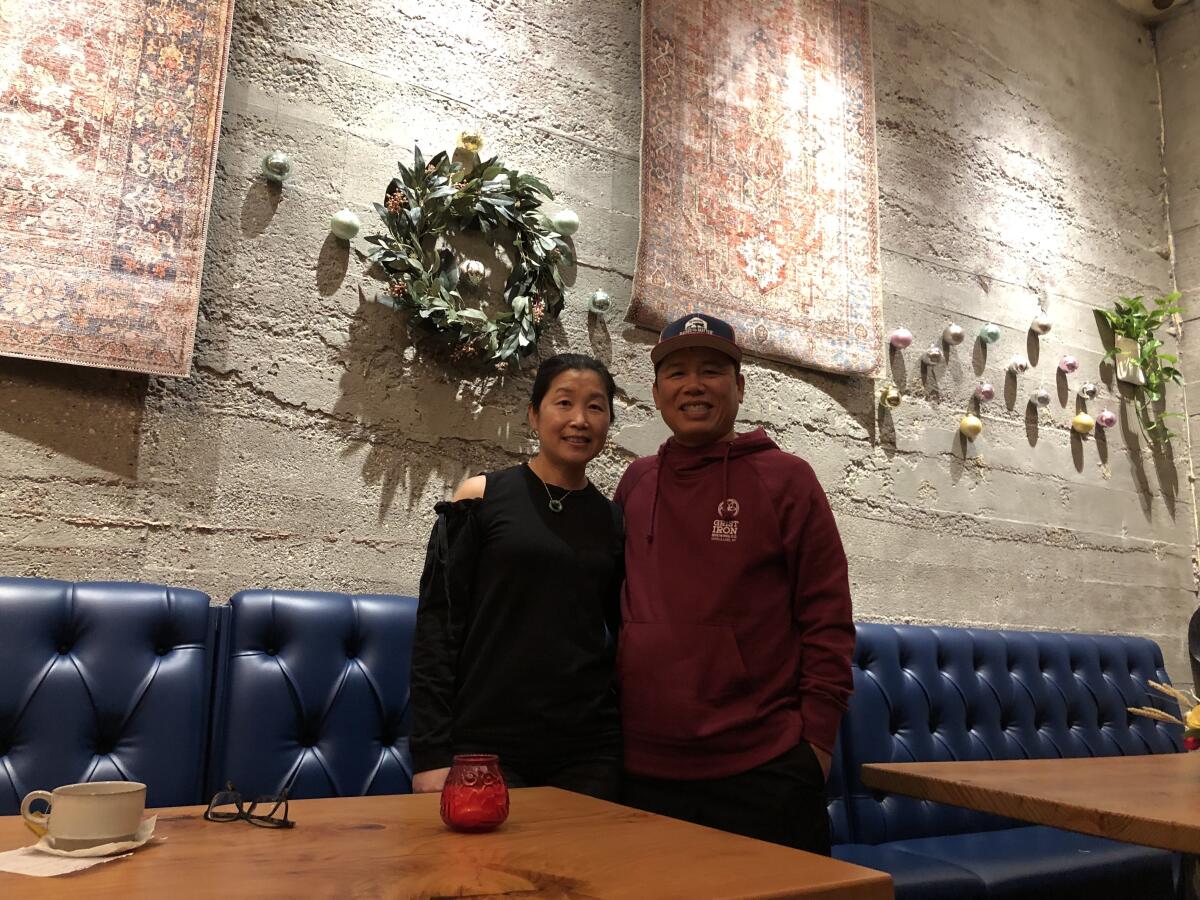
It’s been “a tightrope,” he said, to have “a balanced approach to concerns about the disease and spread and people’s livelihoods.”
Councilwoman Krysi Riggs said she cast the sole no vote against the declaration because she believed the best way for city leaders to push back against mandates is through the judicial system, not through a resolution. But, she said, she understands the frustration with the mandates.
“We’ve been in this situation for 20 months, and I think the general feeling is fatigue,” she said. “When does this come to an end? Yes, there are some lights at the end of the tunnel, but those come with uncertainties and risks as well.”
The pandemic, she said, added to what has already been five years of disaster for Oroville. There was the 2017 failure of a spillway at the Oroville Dam that led to mass evacuations; the 2018 Camp fire in nearby Paradise; the drought that forced the shutdown of a major hydroelectric power plant at Lake Oroville in August.
When wildfires broke out across Butte County last summer, the smoky air in Oroville was toxic — but indoor dining was banned across the state because of the virus, leaving local restaurants in a bind, Riggs said.
“It’s been a yo-yo of what’s acceptable and what isn’t,” she said.
Brian Wong, who opened the Union Bar & Grill in Oroville in fall 2019, said he thought the city’s statement about the mandates was “very courageous.”
As a small-business owner, Wong said he felt like he had to navigate complicated and ever-changing state rules on his own.
“You felt angry, you felt weak. For a whole year, it was nothing but fear and anger going through this whole system,” he said. “Seeing politics creep into all of it, it felt like they were not being sincere about health and safety.”
Wong, who also owns the 109-year-old Chinese restaurant Tong Fong Low, said he spent a lot of money to build a patio for outdoor dining and required his dozens of employees to wear masks for more than a year, until vaccines became widely available.
He has heard all views about the pandemic from his customers and said he welcomes diverse perspectives. That’s why he named his restaurant Union, because it’s his vision of California: “a coming together of all these different people to make up the whole.”
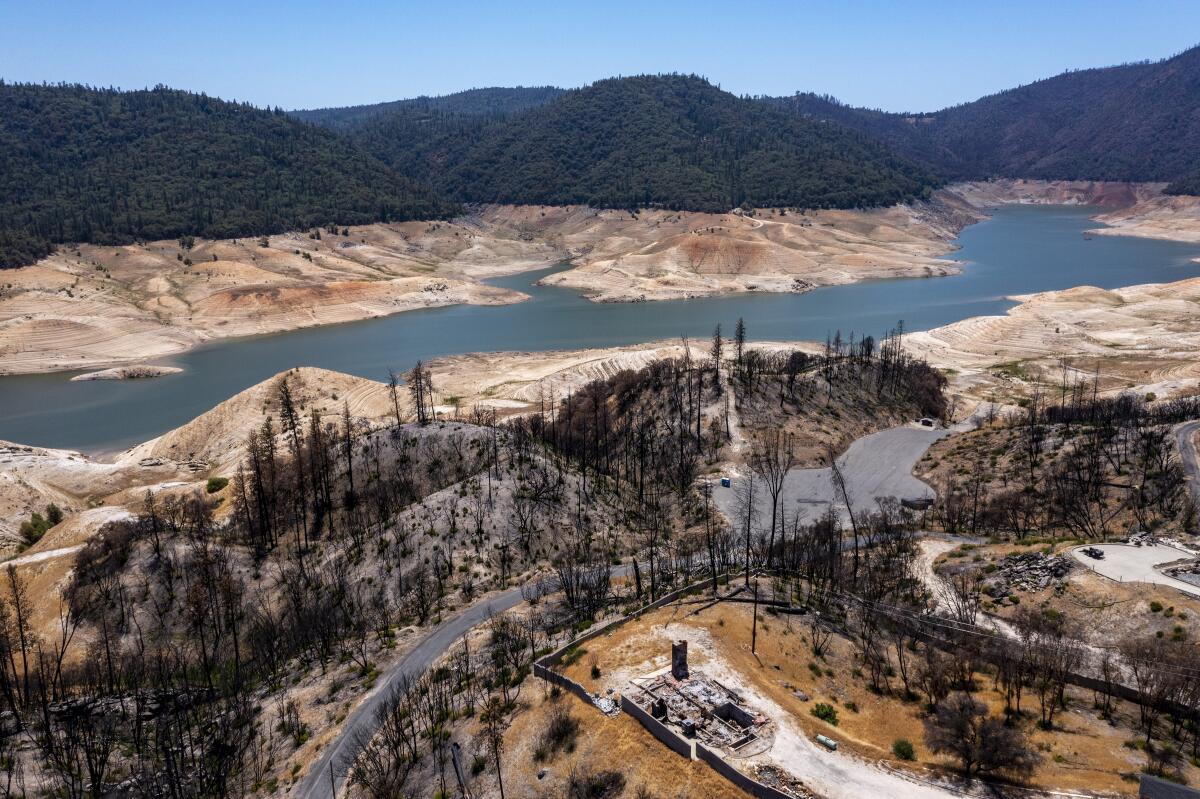
Parked down the street from Union, Joseph Tomlinson, a 24-year-old chef, said he opened his burger truck, Joe’s Lunch ToGo, in March 2020, just as the pandemic was starting.
Tomlinson had not heard much about the constitutional republic declaration, but he figured it couldn’t hurt if it pushed for more local control. He said when he and his employees masked up and required social distancing, he received no harassment from customers.
“We never had any Karens,” he said. “We are a small town, and we support each other.”
But sitting outside his downtown antique store, Gold City Mercantile, Michael Suplita laughed and rolled his eyes when asked about Oroville being a constitutional republic. He responded with a quintessential “dad” joke: “As far as I’m concerned, a mandate is when two men go out to dinner.”
As for the declaration?
“It’s all just talk,” Suplita said. “We’re the new city that says, ‘We don’t have to do whatever you say.’ Sure, OK.”
More to Read
Sign up for Essential California
The most important California stories and recommendations in your inbox every morning.
You may occasionally receive promotional content from the Los Angeles Times.
